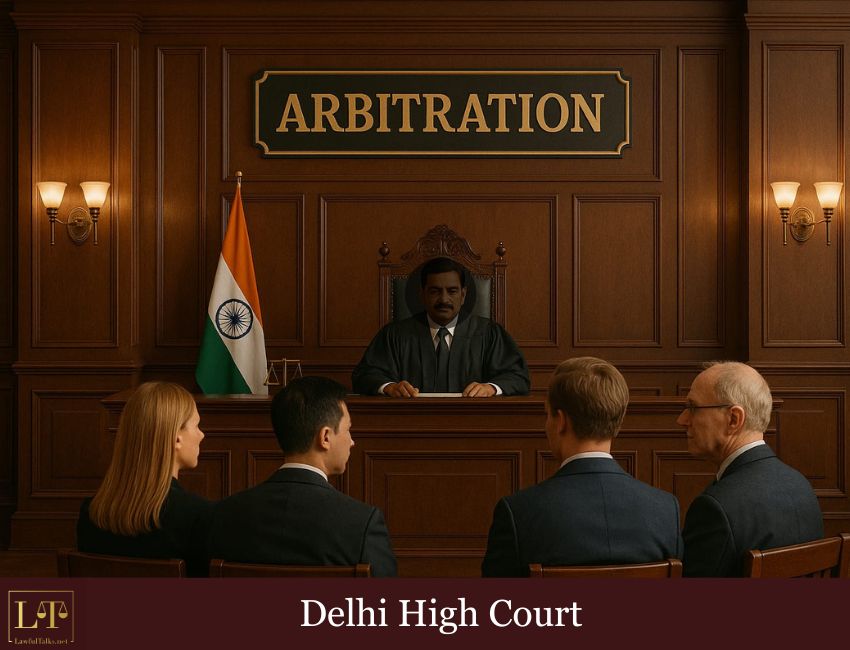Allahabad HC Sets Aside Afzal Ansari's Conviction, Allows Him to Continue as MP

In a notable ruling, the Delhi High Court has held that Indian civil courts possess the authority to grant anti-arbitration injunctions against foreign-seated arbitrations, particularly when such proceedings are found to be oppressive, vexatious, or contrary to the public policy of India.

The Court went a step further and affirmed that civil courts are duty-bound to intervene when arbitration is being exploited to foster unfairness and procedural abuse.
The decision was delivered by Justice Purushaindra Kumar Kaurav in the case Engineering Projects (India) Limited v. MSA Global LLC (OMAN). The Court observed that the power of civil courts under Section 9 of the Code of Civil Procedure (CPC), read with their inherent powers under Section 151 CPC, equips them to protect litigants against misuse of arbitral mechanisms.
Justice Kaurav remarked: “Where the arbitral proceedings are shown to have been vexatious and oppressive in a manner calculated to harass the opposite party, the Civil Courts are not only empowered but also under a solemn duty to intervene. It would be wholly unjust to compel a party to submit to arbitration when the process itself is a vehicle of abuse, serving no legitimate adjudicatory purpose.”
He elaborated that civil courts, being the guardians of civil rights, cannot be expected to blindly enforce arbitration clauses in cases where the process itself is being misused. According to him, relegating a party to arbitration under such circumstances would be a "mechanical application of statutory principles", which runs counter to both equity and the constitutional guarantee of access to justice.
In exceptional scenarios, Justice Kaurav noted, the courts must assume the role of vigilant sentinels:
“It is in these exceptional cases that the Civil Court must act as a sentinel on the qui vive(lookout) i.e., watchful guardian, ensuring that the party alleging vexation and oppression is not left remediless. The Court must, in the exercise of its judicial conscience and upon a satisfaction of procedural abuse, extend its protective jurisdiction and prevent the continuation of proceedings that are clearly unjust, thereby upholding the rule of law and preserving the sanctity of adjudication.”
These observations were made in the context of a suit filed by Engineering Projects India Limited (EPIL), a central government-owned public sector enterprise, seeking an injunction against the continuation of an arbitration seated in Singapore and administered by the International Chamber of Commerce (ICC).
The arbitration had been initiated by MSA Global LLC, a defense and security systems integrator based in Oman. The dispute stemmed from a contract between the two companies concerning a border security infrastructure project at the Oman-Yemen border, for which EPIL had been appointed as the main contractor.
The arbitral tribunal comprised Jonathan Acton Davis as the presiding arbitrator, with Andre Yeap (appointed by MSA) and Justice A.K. Sikri (Retd.) (appointed by EPIL) as co-arbitrators.
However, EPIL raised serious concerns about Yeap’s impartiality after discovering his prior involvement in arbitral proceedings involving Manbhupinder Singh Atwal, who serves as MSA’s Chairman, Managing Director, and Promoter.
EPIL argued that Yeap’s failure to disclose this connection violated Article 11 of the ICC Rules, thereby casting legitimate doubts on his neutrality and independence.
Although EPIL challenged Yeap’s appointment before the ICC Court, the challenge was dismissed. Thereafter, EPIL approached the High Court of Singapore seeking judicial review of Yeap’s continued participation. Simultaneously, it moved the Delhi High Court, seeking an injunction against further arbitral proceedings.
In its defense, MSA contended that EPIL was forum shopping and attempting to delay and derail the arbitration process through parallel proceedings.
After thoroughly examining the matter, the Delhi High Court upheld its jurisdiction to entertain the suit and held that the case satisfied all three standard tests for granting an interim injunction namely, the existence of a prima facie case, the balance of convenience and irreparable injury leans favourably towards EPIL the plaintiff.
It was therefore determined that this is a fit case for grant of interim injunction.
The court concluded that, “Accordingly, the proceedings of the Arbitral Tribunal shall stand stayed till the pendency of the suit and the parties are injuncted from participating in the same.”
Case Details: Engineering Projects (India) ltd vs MSA Global LLC (OMAN)
.

Shalini Chavan
Advocate, Bombay High Court
Latest Posts
Categories
- International News 19 Posts
- Supreme Court 390 Posts
- High Courts 383 Posts



















































































































































































































































































































































































































































































































































































































































































































































































































